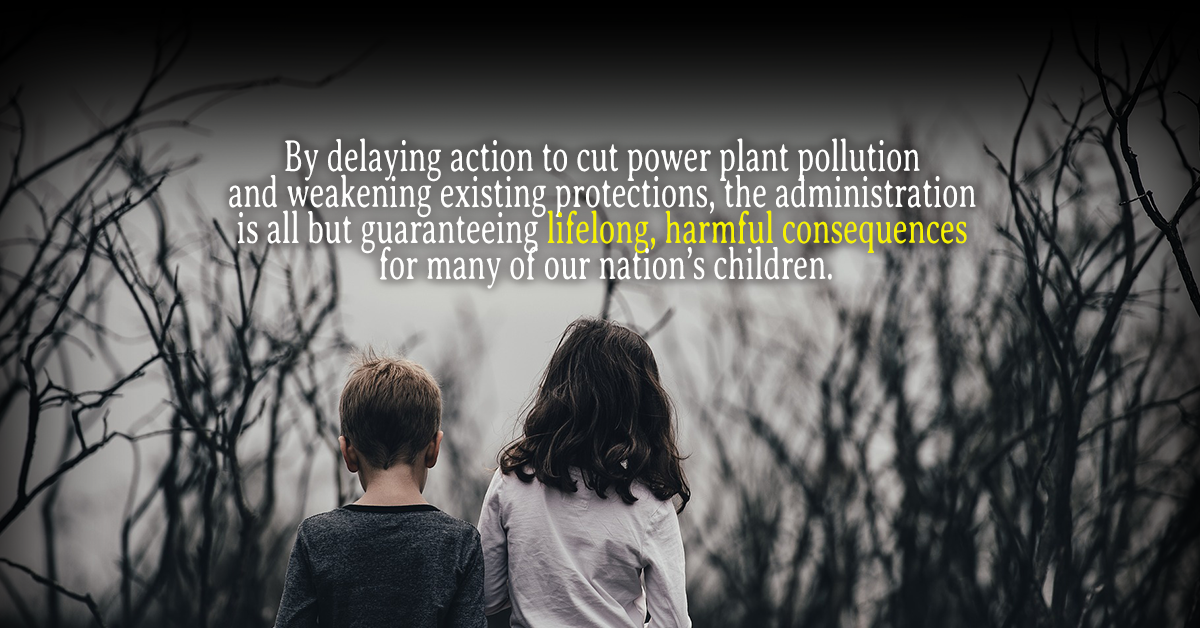[The Hill] By Gary Cohen and Aparna Bole
Scott Pruitt, the administrator of the Environmental Protection Agency (EPA), is attempting to repeal the Clean Power Plan, lifesaving standards that set the first federal limits on carbon pollution from power plants and encourage investment in cleaner, safer sources of energy. If he succeeds, it would be a public health disaster.
As a replacement for the Clean Power Plan, Pruitt has indicated he is considering an “inside the fence line” approach, narrowly focused on improving the efficiency of coal-fired power plants, one at a time. This is a dangerous alternative. This approach would actually do more harm than good, causing thousands of additional pollution-related deaths each year and costing billions more than the Clean Power Plan.
Toxic air pollutants from coal-fired power plants, including mercury, lead, and arsenic, have been shown to cause respiratory illnesses, neurological damage, heart disease, stroke, cancer, and premature death. In the United States, the annual deaths associated with fine particulate matter alone have been estimated to be as high as 52,000 — more than all the people killed in car accidents each year.
Infants and children are particularly at risk for many reasons. For example, critical phases of lung development begins in the fetal period and continues through the teens. Children also breathe more air per pound of body weight than adults.
Additionally, a growing body of scientific research demonstrates that childhood exposure to pollution from coal-fired power plants has neurologic consequences, including impaired cognitive functioning and reduced verbal and nonverbal IQ, memory, test scores and grade-point averages among school children.
Air pollution also disproportionally threatens pregnant mothers by negatively impacting fetal health and contributing to preterm birth and low birth weight. By delaying action to cut power plant pollution and weakening existing protections, the Trump administration is all but guaranteeing lifelong, harmful consequences for many of our nation’s children.
Instead of continuing down the costly and dangerous path of repeal and replace, Pruitt and the EPA can protect the health of our communities and a healthy future for our children by implementing the Clean Power Plan. Doing so would prevent up to 90,000 asthma attacks in children, 1,700 hospital admissions, 300,000 missed school and work days. A recent analysis by the Trump administration even found that implementing the Clean Power Plan would prevent as many as 4,500 premature deaths each year.
The Clean Power Plan will also save money and reduce health care costs, providing public health and climate benefits worth up to $54 billion per year. We have already seen the health cost savings of reducing carbon pollution in the nine states who participate in the Regional Greenhouse Gas Initiative (RGGI). Since 2009, reducing carbon pollution and other air pollutants have generated $5.7 billion in health savings and other benefitsas a direct result of healthier families and workers.
Carbon pollution from coal-fired power plants is also a leading cause of climate change, which is one of the most significant current threats to our public health and safety. Last year, many communities across the U.S. experienced devastating and unprecedented storms and wildfires, causing hundreds of deaths and injuries and lingering mental health impacts for the thousands who lost their homes and livelihoods.
Extreme weather, worsened by climate change, caused $306 billion in U.S. damage in 2017, the most expensive year on record. Advances in science have now made it possible to link more intense and more frequent extreme weather events to climate change.
According to a study by an international coalition of scientists, human-caused climate change made the record-breaking rainfall during Hurricane Harvey roughly three times more likely to occur and 15 percent more intense.
By reducing carbon pollution 32 percent below 2005 levels, the Clean Power Plan is critical to avoiding the worst impacts of climate change and protecting our communities from costly storms and deadly wildfires — as well as the trauma that accompanies these tragic events.
Every day that pollution from coal-fired power plants continues unabated costs precious lives, leads to lifelong health impacts for our youngest and most vulnerable citizens, and increases the likelihood that thousand-year storms will become our new normal.
The EPA must fulfill its mission by protecting the most vulnerable Americans from well documented threats. In this case, the path is clear: The EPA should heed the scientists, parents, health professionals, and vast majority of the American public, and fully implement the Clean Power Plan. Lives are at stake.
Gary Cohen is president and co-founder of Health Care Without Harm and Practice Greenhealth, and has worked to further the environmental health movement for 30 years. His achievements include The MacArthur Foundation’s Fellows Award (2015) and the White House’s Champion of Change Award for Public Health and Climate Change (2013).
Aparna Bole, MD, FAAP is division chief of General Academic Pediatrics & Adolescent Medicine at UH Rainbow Babies & Children’s Hospital in Cleveland, Ohio and active in pediatric environmental health advocacy.
